Ah, the Dutch and their monarchy. Let’s just say they have a bit of a love/hate relationship — like siblings who’ve never quite gotten along but will sit next to each other at formal events.
You’re probably wondering, what do the Dutch even think of the monarchy? What’s their opinion of the king and queen? When did the Kingdom of the Netherlands even begin?
Well, you’re in geluck because we’ve compiled the unholy cacophony that is the history of the Dutch Royal Family and how Dutch people really feel about their monarchs.
Spoiler: there’s a lot of tea — so pinkies up, queens. ☕
🏰 A brief history of the monarchy in the Netherlands
Where did this interesting royal history begin? It all goes back to one man — surprise, surprise — the famous Prince of Orange (Willem I).
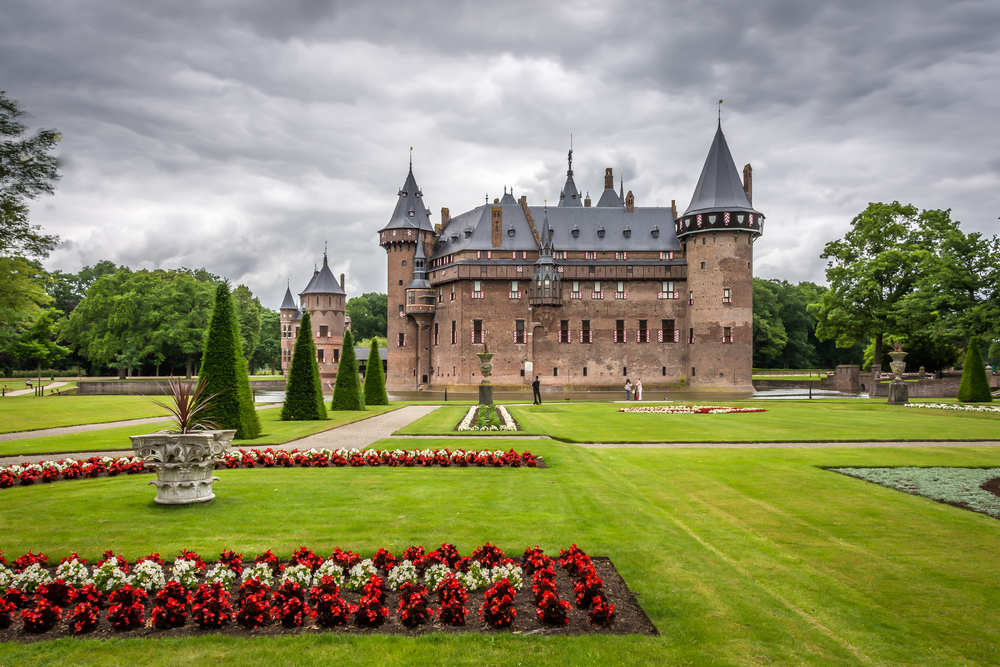
Prince Willem I followed a long line of victorious nobles, and his descendants would go on to be celebrated across the world for their victories in war — including that one time Prince William III became King of England.
READ MORE | That time the Dutch conquered Britain (ja, we’re serious)
The Royal Family in the Netherlands was established all the way back in 1814 after Prince Willem I won a historical battle against Napoleon. Since then, the Netherlands has been its own independent kingdom.
The Dutch Monarchy passes by right of succession according to those who are the descendants of Prince Willem I. This means that all the Dutch Royals are related to the historical Prince of Orange.
However, in terms of long-reigning monarchies across the world, the Dutch Royal Family is actually quite young.
Who are the current Dutch monarchs?
King Willem-Alexander is currently the reigning monarch in the Netherlands, having been responsible for the crown since 2013.
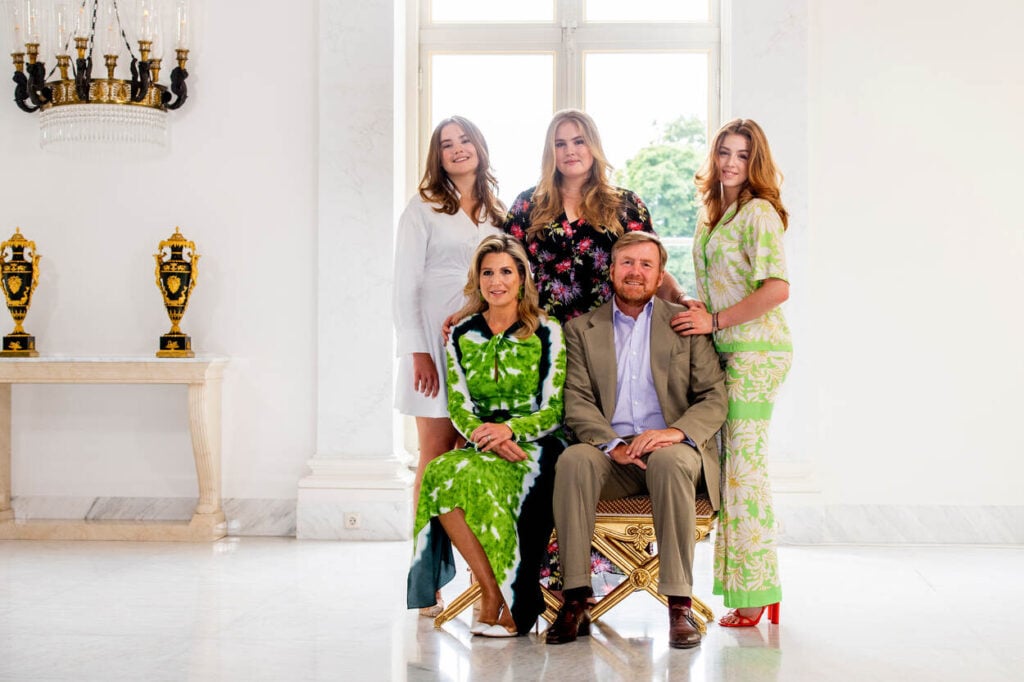
King Willem-Alexander is married to Queen Máxima. They married back in February 2002 and have three daughters together: Crown Princess Catharina-Amalia, Princess Alexia, and Princess Ariane.
🤴 What is the role of the monarchy in the Netherlands?
The first thing you should know about the royal family in the Netherlands is that the King can’t decide to impose a ban on stroopwafels one morning because he ate a particularly bad one the day before.
The monarchy in the Netherlands has a constitutional function. The King is the Head of State, and he, along with the other ministers, makes up the government.
READ MORE | What was the Eighty Years’ War? The Dutch War of Independence explained
However, under the constitution, King Willem-Alexander is the president of the Council of State, a historical role that is purely symbolic in nature. The Dutch King’s main duties are:
- Receiving heads of state
- Paying state visits
- Attending jubilee events of important social institutions
- Visiting and supporting the victims of national disasters
Sure, these are very kingly duties, but that doesn’t mean the King has much of a say when it comes to legislation and the introduction of laws — and you know what? Goed.
🙄 How do the Dutch feel about the Royal Family?
Yes, we know, it’s the burning question — do Dutch people actually like their monarchy?
Like many countries with monarchical constitutions, the answer to this question is a bit complicated. It sort of opens up a can of worms. 👇
What’s your view on the Dutch Royal Family?
byu/Little-Homework8979 inNetherlands
As of 2023, 55% of Dutch people stated that they wanted the Netherlands to remain a monarchy.
READ MORE | Dutch Quirk #121: Hate on the King and all of his blunders
When you compare this figure to the 35% of young people who believed that Britain should remain a monarchy in 2020, it seems that the Dutch quite like their royal family.
But, in 2023, it was revealed that less than half of Dutch people were satisfied with the King and his rule. That being said, 64% of survey respondents said they were happy with Queen Maxima’s performance in the royal family.
But the Dutch are obsessed with orange?
We know how it looks — the Dutch may not be 100% supportive of the monarchy, but they sure like to wear their orange hats, scarves, and T-shirts.
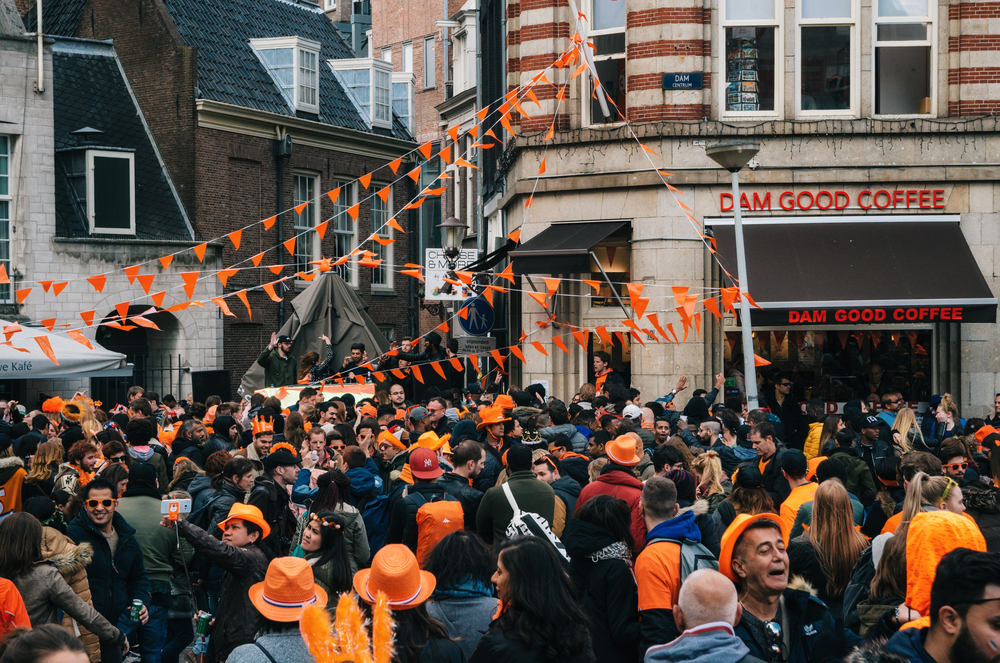
Part of this comes down to national pride. While the colour orange brings us back to the Dutch monarchy and their beloved Prince of Orange, this doesn’t necessarily mean every single person who wears orange on King’s Day is a monarchist. 🍊
And they celebrate King’s Day!
Speaking of K-day, this major aspect of Dutch culture is celebrated annually on the king’s birthday. It is a day of festivity (and lots of drinking! 😉) across the Netherlands.
READ MORE | Why does the Netherlands love orange? The full explainer
Taking place on 27 April, the king visits a different city each year to take part in the festivities.
The Dutch tend to enjoy a day of celebration, parades, and even street games on King’s Day. Perhaps comparable to St. Patrick’s Day in Ireland, the day is dominated by orange-wearing Dutchies celebrating their nation and history.
😨 Major controversies in the Dutch monarchy
However, just like every monarchy, even the Dutch Royals have been involved in their share of controversies over the years. Grab the towels! We’re about to spill some hot royal tea.
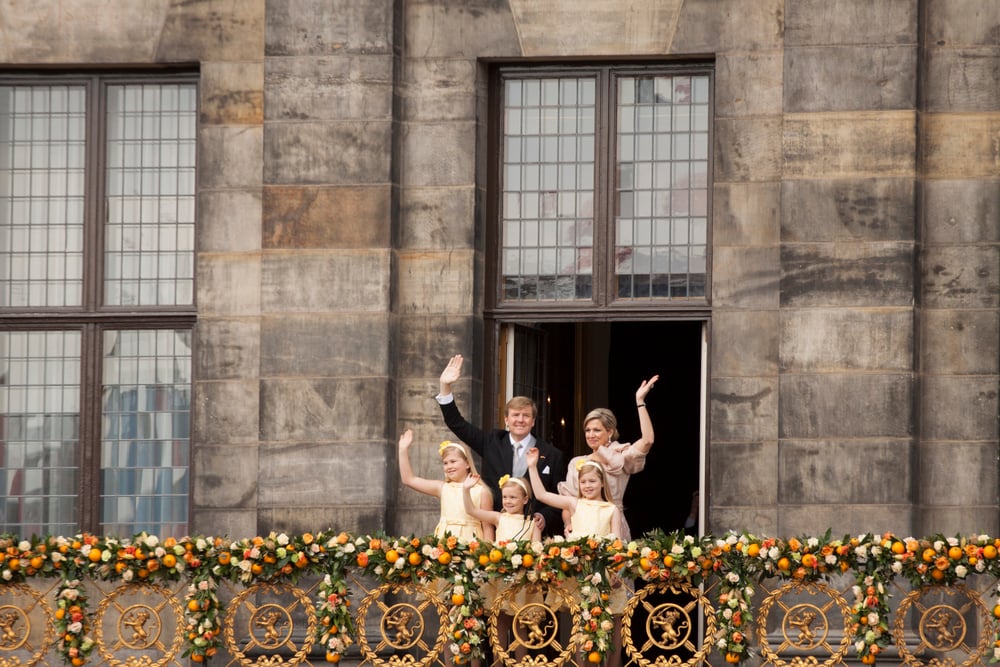
Coronavirus doesn’t spread to royals, apparently
Perhaps we should start with the fact that, while they were away on holiday during the global pandemic — y’know, the one where the entire country was in lockdown — they were also caught disobeying social distancing rules.
Nice for some, but while y’all were partying it up in Greece, we were locked away from our closest friends and family. 😒
Or what about the party they threw for Princess Amalia’s birthday in December 2021 while coronavirus cases were surging?
Prince Bernhard’s illegitimate children
After the death of Dutch Prince Bernhard, it was revealed that he had fathered two illegitimate children during his lifetime — one of which was living in France and another in America.
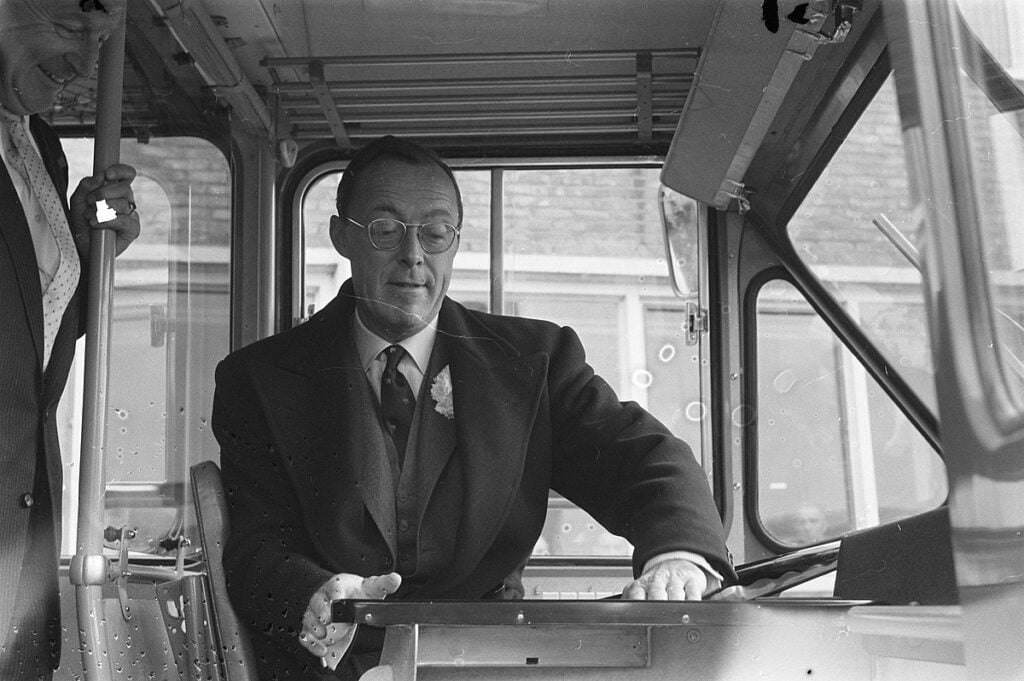
This was revealed during an interview which was released posthumously. Although the Prince fathered two children outside his marriage with Queen Julianna, mother to Queen Beatrix, he wasn’t the world’s biggest time-waster.
He served in World War II, and, upon his death, he said, “If the image is that I was a scoundrel now and again, I’ll give people that.” 🤷♀️
The infamous golden coach
The Golden Carriage was rolled out and paraded about on Prinsjesdag every year — however, it was always met with great debate and pushback.
Why? Well, one of the panels depicts images of slaves. Not only that, but the panel is of a white woman sitting on a throne, surrounded by dark-skinned people kneeling and offering gifts.
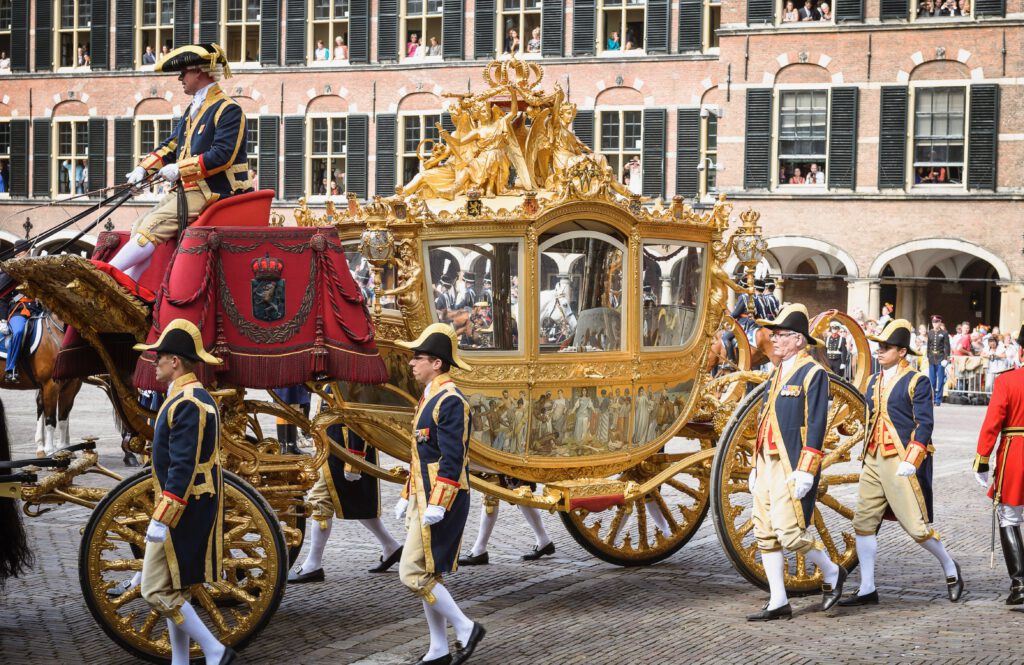
And guess where the gold came from — yep, Suriname.
READ MORE | Where’d you get that?! Golden Carriage decorated with gold from Suriname
The Netherlands’ long and troublesome history of colonisation is very apparent in the carriage, making it a controversial item.
Yet, the Dutch Royal Family is making moves to acknowledge their sometimes nasty past, and the carriage was retired in January 2022.
👑 How has the Dutch monarchy adapted in the 21st century?
Although the Kingdom of the Netherlands was established a mere 200 years ago, we have changed a huge amount as a society since those times, and the monarchy has had to change along with us.
Dutch monarchs can now be in a same-sex marriage
The Netherlands was the first country in the world to legalise gay marriage, so the monarchy has had some time to adapt to this epic move towards equality.
In 2021, the news came that if Princess Amalia wished to marry a member of the same sex, she would not have to give up her future role as Queen, something she would have had to do in the past.
READ MORE | All you need to know about marriage and parental rights for same-sex couples in the Netherlands
The Dutch monarchy said: gay queens welcome 💅 — and this is certainly a big achievement for any LBGTQ+ members of the royal family! 🏳🌈
Princess Amalia — a conscious royal
Speaking of Princess Amalia, she may go down in history as perhaps one of the more socially conscious royals. Upon their 18th birthday, most royals are given an allowance.
Princess Amalia, however, declined the offer of a cool €1 million (!) a year and has chosen not to take her royal allowance whilst she completes her studies.
Princess Catharina-Amalia, The Princess of Orange looked every inch a Queen today at her first #Prinsjesdag 👑 pic.twitter.com/179A71OniB
— CoutureAndRoyals (@CoutureRoyals) September 20, 2022
The princess started her degree at University of Amsterdam in Politics, Psychology, Law, and Economics this September and opted to live in a shared student house, like thousands of other students, rather than in a private, rented residence.
Helaas, in spite of her willingness to live a normal student life, the princess has been forced to move back in with her parents due to outside threats. She recently even spent a year in Madrid amid these safety fears.
She is still considered normal in other ways, however. Like many other Dutch girls, at the age of 18, the princess was also sent a letter of conscription.
🤔 But what does the monarchy really represent?
The trouble with monarchies is that they are the result of a long history of war, and within that, there’s usually a fair bit of colonisation involved.
The Netherlands was no stranger to colonisation, and with it, slavery. Though slavery was outlawed back in 1814, the effects of those years are still seen today — such as in the panels of the Golden Carriage.
A dark colonial past
Like many European countries, the Netherlands sought to expand its wealth and territory in the 17th century into other areas.
READ MORE | What was the VOC? The Dutch East India Company explained
The headquarters for the Dutch Slave Trade was located in Fort Elmina in Ghana, where a massive 600,000 slaves were brought to the Netherlands for forced labour.
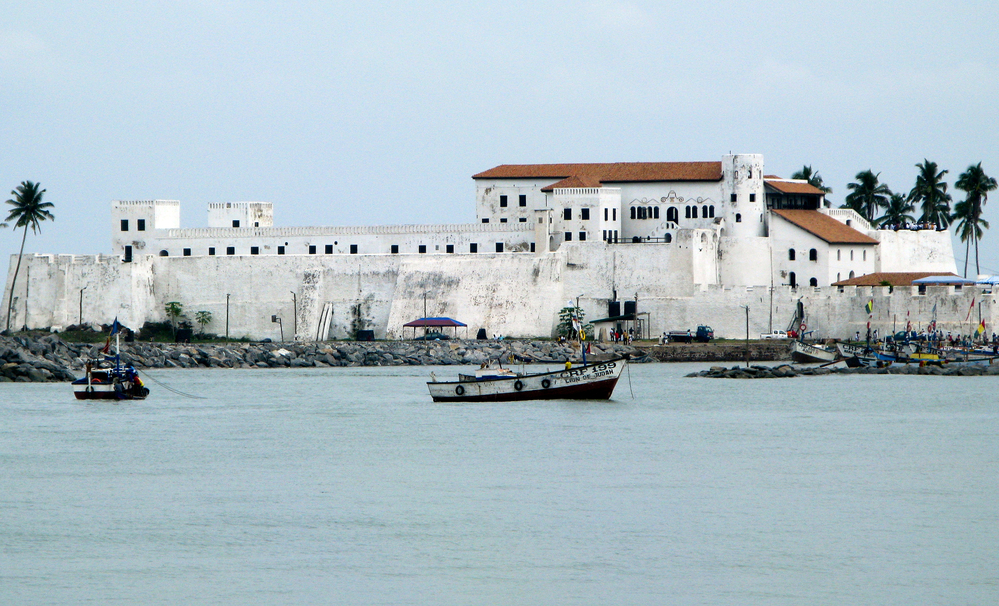
The Dutch were responsible for half of all slave transports to the New World during the 17th century.
The Dutch still suffer from some colonial hangovers. Celebrations such as Zwarte Piet, a Christmas tradition for many Dutchies, have certainly been shaped by their colonial history.
What does this mean today?
Well, it means that the Dutch monarchy has to acknowledge its long history in order to move forward.
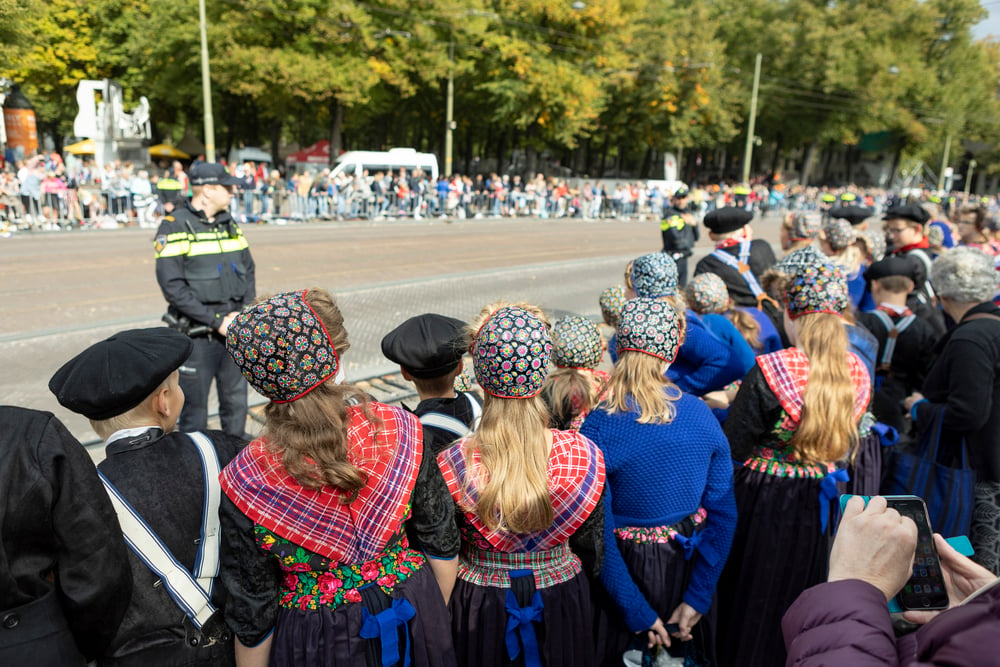
Efforts such as retiring the Golden Carriage demonstrate a real desire to acknowledge the harm they have caused to the royal reputation.
Also, earlier in 2024, the majority of the Dutch Cabinet officially voted in favour of making the king pay taxes for the first time. For now, the king happily continues to enjoy paying zero tax on his annual income, but those days are numbered.
As we move further into this progressive century, we hope the monarchy can keep up and keep making changes to adapt and represent the Dutch people!
Though the Dutch monarchy is barely over 200 years old, the royal family still has quite an influence on Dutch culture.
This makes any progressive steps the family takes have even more impact on Dutch people and will help launch the Netherlands into this new, open-minded, century.
What do you think of the Dutch monarchy? Tell us your thoughts in the comments below!





I am Senaka De Zoysa Siriwardena, from Sri Lanka. Our country was once ruled by VOC government some 300 years ago. We never had a particularly troubled period though from Dutch with compared to others. Therefore,
I read this article with much interest. We can see Dutch Royal family is peace loving, noble and respectful as well as loved.
I have something special for the Netherkands to offer which belonged to them in my thinking.
I request this writer to take one message to HM King Willem Alexander that I have a very very special, priceless artifact with me that has long relationship to Dutch history in Sri Lanka. How can I offer it back to the Netherlands as a mark of respect and in appreciation of Dutch Royal Family for being a 21st century nobles that symbolizing human values and compassion?
Thank you
Hi Senaka,
I’m glad you enjoyed my article. We suggest you contact the Rijksmuseum in Amsterdam if you have an artefact you would like to pass on. They are the national museum of the Netherlands and will be able to give you some more guidance.
We wish you the best of luck.
Kind regards,
Heather from DutchReview.
Scrutinized this article on facts I found nothing. Maybe there could be more facts but seeing the general structure of how this article is compiled, it’s a OK read. One fact should be included: The Dutch government can ditch the monarchy at any time they want. And yet, since that became possible, it never happened because there’s nothing like that in any way a majority in parlement would ditch them. Relatively to the costs and benefits, it’s beneficialto have King for opening doors around the world. And this King is in office with a great spouse doing a marvelous job at the UN.
Personally, I am glad I can still choose to keep the monarchy or get rid of them. Only a few folks are left with this choice.
The Netherlands is lucky still to be a constitutional monarchy.
As an American expat living in the Netherlands I find the monarchy useful. A stable head of state without wielding too much power, but at the same time projecting a world image of the Netherlands and a monarch that appears accessable to the people, King’s Day walks, touring disasters on the ground, not from a helicopter are two quick examples. Also on some levels the monarchy seems to rise above the left/right politics so common in my old country. I’m certain the Royal Family has an opinion on the political events of the day, but to not use their status to promote their views openly. It makes me smile when I realize he has a side job, as a co-pilot with KLM!
Sinterklaas and zwarte Piet are no Christmas traditios .It is a tradition on the 5th of december
Echt he, die fout maken ze allemaal, maar ondertussen wel onze tradities afzeiken. Walgelijk.